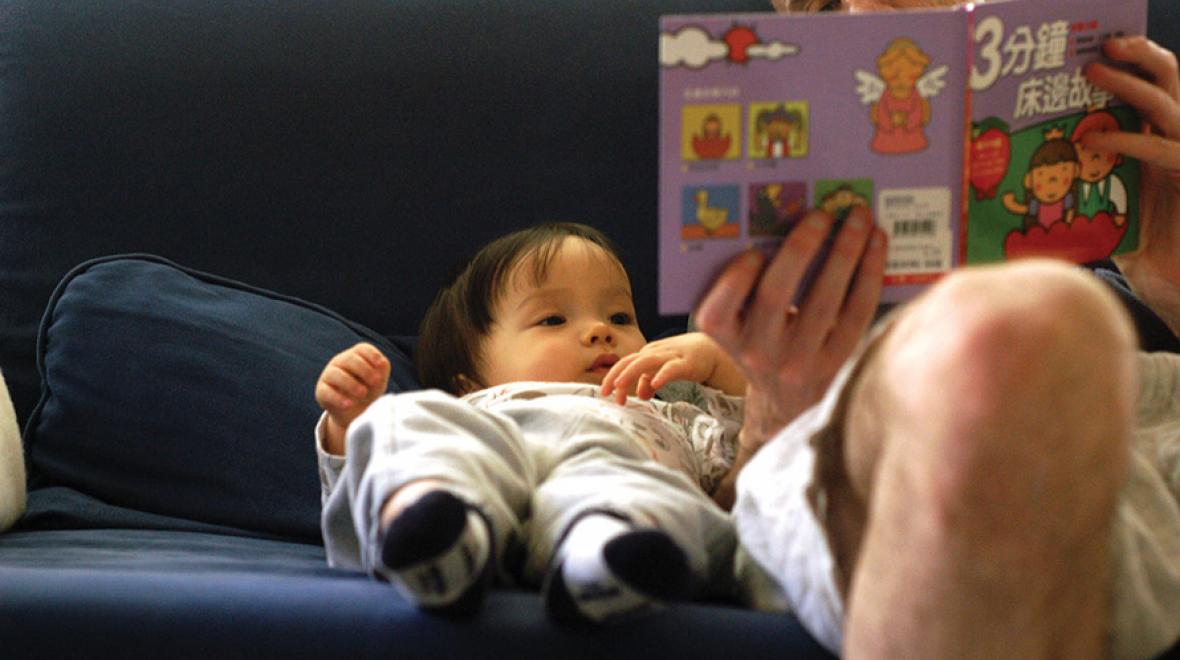
Photo:
Credit: JiaYing Grygiel
My 6-year-old son’s class is a mini United Nations; his classmates go to Saturday Chinese school, Russian school, German school and Sunday Swedish school. But my kids don’t, because every minute with Mama is an immersive education in Chinese.
I didn’t set out to raise my son to be bilingual; when I had him, I barely spoke Chinese. My family moved to the U.S. from Taiwan when I was 4; I grew up in upstate New York, where I flunked out of the Friday-night Chinese classes my mom forced me to attend.
Getting a second language to stick
- Learn with your kid. It’s not enough to just hear a language once a week in a classroom. Even if you’re unsure of yourself, try speaking the language at home, too.
- Show them how it’s useful. Kids need opportunities to use their skills. Even if it’s ordering food and saying “xie xie” (thank you), it counts.
- Find your community. Your kid will need friends who speak the same language, and you’ll need the support of other parents.
Then, 11 years ago, I moved to Seattle for a job and discovered that here, Chinese is everywhere. You hear it spoken all the time; it’s printed on signs in the Chinatown–International District; it’s even taught in Seattle public schools. In Seattle, Chinese class isn’t just for resentful Chinese kids; it’s for every parent who is trying to give their kid an edge.
If you want to pick a second language, Chinese isn’t a bad choice. It’s the most spoken language in the world, with Mandarin being its most common form. (Spanish is a distant second for most spoken language, followed by English in third place.) Nearly 1.3 billion people speak Chinese, which is something like one out of every six people in the world. Especially for those of us who live on the Pacific Rim, speaking Chinese can be a useful skill when your child grows up and goes into business, leadership, diplomacy . . . a mom can dream, right?
For me, teaching my son my native but mostly forgotten language came down to a matter of money. I’m not musical and I’m not athletic, so the one skill I could give my baby for free is a second language. So, we learned together. He didn’t judge me as I slowly sounded out the words; he only cared that it was his mother’s voice. We learned new vocabulary words, per his interests: “street sweeper,” “cherry picker,” “snow plow.” And over these past few years, he and I have become fluent speakers.
And while no one’s given us grief when we’ve spoken Chinese in public, Queen Anne mom Allison Riccardi does get some curious looks. Riccardi is an Italian-American transplant from Michigan who speaks flawless Chinese. Her husband is from China, and Riccardi wanted their kids — 6, 4 and 1 — to learn Chinese so they can connect with their family and culture. At home, her children listen to Chinese kids’ music, watch Chinese cartoons and read Chinese books.
“Some people are worried that our kids won’t learn English because when they started preschool, they had a very limited proficiency,” Riccardi says. “I have been more concerned about their Chinese! English is everywhere, and they will inevitably pick it up.
When one parent speaks Chinese and the other doesn’t, your home life can feel like living in a foreign country.
“We work hard to keep their interest in Chinese,” she continues. “We did everything possible to immerse them. So far, the results have been good.”
All the research studies tout the benefits of being bilingual. It’s good for baby’s brain development! It will help a child do better in school! It will teach empathy! This might all be good and true, but you should also know the pitfalls to a bilingual household.
It can divide your marriage
Chinese is a tonal language, which can be hard for adults to pick up. Even after six years of immersion learning, my husband can’t identify high-frequency kid words like “snack,” “bus” or “sleep.”
When one parent speaks Chinese and the other doesn’t, your home life can feel like living in a foreign country. My children and I talk, argue, joke — and my husband has no idea what is going on.
Riccardi and her husband both speak Chinese, but her parents don’t. When her daughter was 2, she hit her grandmother and said in Chinese, “I don’t like Nonna because she doesn’t speak Chinese.”
Other people assume your kid is a social recluse
A mom friend, whom I’ve known since our kids were babies, recently mentioned that she’s only ever heard my 6-year-old say maybe one sentence. He’s kind of introverted to start with, and compounding that problem is his conviction that when he’s with Mama, our world is Chinese.
No matter who talks to him, my kid will not respond in English and he won’t play with kids who don’t speak Chinese. He has great language skills — at the cost of friendship skills.
Sooner or later, they will turn on you anyway
So, congratulations, you did a great job teaching your child a second language. In our mostly monolingual world, good luck getting that second language to stick.
West Seattle mom Amanda Hsieh grew up in Taiwan and met her American husband there. She taught her daughter, Evelynn, Chinese so that Evelynn could talk to the Taiwanese side of her family. When Evelynn was 4 and her mom told her to talk in Chinese, she pointed out, “But Mommy, you speak English, too!”
Now Evelynn is 5 and in school, and she’s switched to mostly English. Hsieh already hears an “ABC” (American-born Chinese) accent in her daughter’s voice. Even when they hang out with Taiwanese friends, the kids speak English together.
“The foundation is still there,” Hsieh says, “but if you don’t practice, you don’t talk every day, you will lose it.”
As for my family, Chinese has been our daily MO for my 6-year-old’s entire life. I’m in too deep to drop the second language, which is why, together, my son and I are teaching the language to his 2-year-old brother. He’s learning new words every day, and already knows that each object has two words. Someone says “crow,” and he’ll run over with “wu ya!” Or he’ll hear “flower,” and he’ll chime in with “hua!”
He’s picking up English, too. Recently, my toddler added a new word to his lexicon that any parent who’s survived the terrible twos will universally recognize: “Nooooo!”
Resources and classes to tryStory times at the Seattle Public Library: The Seattle Public Library offers wonderful Mandarin story times at the following branches: University (Mondays at 6:45 p.m.), Beacon Hill (Thursdays at 11 a.m.), Lake City (Fridays at 11:30 a.m.) and the Chinatown–International District (Saturdays at 1:30 p.m.). Check the branch’s events page before you go to make sure the story time is scheduled for that week. The teachers are fun, and the story time is free. It’s a no-cost way to dip your toes into a new language. The library also offers story times in Spanish, Somali, Vietnamese and American Sign Language. Mingyuan Evergreen Chinese School in Wallingford: This parent-run school offers Saturday-morning Chinese class for kids 3–18. Kids start learning to read and write at age 5, using both the phonetic system and Pinyin. There’s even an adult conversation class for parents. Language Garden Academy in Broadview: Iwen Chiu is an engaging educator who runs an in-home, Mandarin-immersion preschool for kids 3–5. It’s worth getting on her waiting list. Sponge School in Seattle, Kirkland and Lynnwood: Sponge is a good option for nonnative speakers wanting to try out a new language. The school offers classes in Chinese, Spanish, French, Japanese, Hindi and German. |











